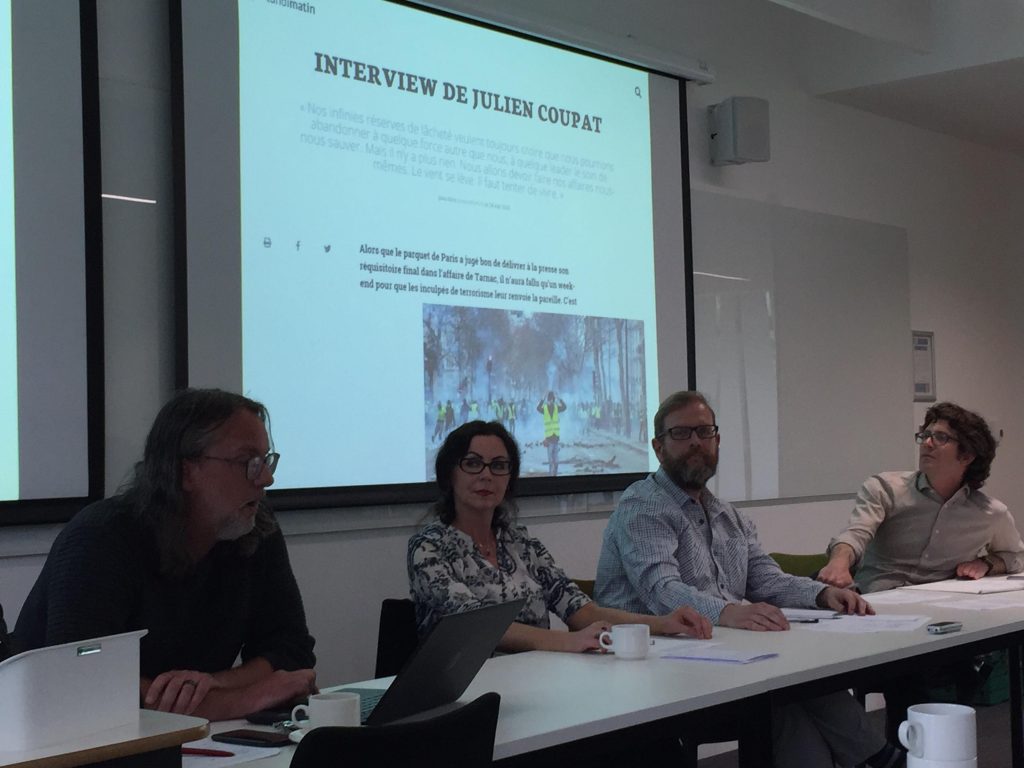by Elena Paris[i], Christos Marneros[ii]
with Dr Thanos Zartaloudis
The workshop was generously supported and sponsored by the following research centres and groups to whom we owe heartfelt thanks: The Research Group on Philosophy, Political Theology and Law in association with the Centre for Research in Political Theology (CRIPT; formerly at Birkbeck College), with all of its activities henceforth relaunched and hosted now at Kent; see for more information the new website), and the Research Group on Social Critiques of Law (SoCriL) and Kent’s Interdisciplinary Centre for Spatial Studies (KISS).
Particularly extended thanks are due to our workshop co-organisers: Taylor Weaver, Elena Paris, Christos Marneros, John Ackermann; and to our excellent administrative support team: Zoë Dudeney, Tina Grove and Jon King. Thanks also to Andrea Shieber for her kind assistance with the publication.
In response today to the omnipresence of populism(s) and endless debates about (with and against) populism, the workshop aimed to discuss the main categorical division as to whether populist movements need to be inscribed on a map based upon the traditional divides (eg right and left, liberalism and democracy etc), or as demanding a wholly new cartography, one where populism appears as the counter-power to social elitism, the political establishment and mainstream media. And even then, the workshop aimed to ask, what would that mean for the attentive measuring of both elitism and anti-elitism, populism and anti-populism. The original outline call for the workshop can be read in full here.
The workshop gathered 13 speakers from different parts of the world, specialising in legal theory, political philosophy, constitutional theory, cultural studies, religious studies, as well as a considerable audience of 40 participants. The workshop opened with an introduction by Dr Thanos Zartaloudis (Reader in Legal theory and history, Kent Law School) and was followed by the opening talk by Dr Anton Schütz both from Kent Law School. Four panels followed with three presentations each, with time for rich interactions and contributions from the audience.
The call for the workshop stated that “unimpeded by the interminable motions of no-confidence tabled against the term “populism”, the debate about populism continues its fatberg-growth, helplessly blocking an ever more disproportionate part of the sewers of political decision-making. The post-Leviathan bugbear populism defends the values of democracy on the basis of a re-possessed socialist anti-elitism, cast in a new power-elite’s rhetoric.” It continues by adding that “Melodramatically, it admonishes those unimpressed with populism that they show a “loss of faith in politics”, that those who “play with fire” will eventually “reap [..] the whirlwind” (T May and B Johnson resp., January 2019), or that “government is the servant of the people, not of parliament” (L Fox). As everyone knows since long, the essential bits in matters of politics and society is to be found outside of the text. Candidates for self-reference exist (eg text in Derrida, society in Luhmann); -isms demand an extimate angle, genealogical inquiry, careful contextualisation and re-description, while avoiding what has been called the monographical bias (in a nutshell: that which is central to my inquiry must be equally central to the world in which it emerges). “
It was thus proposed as essential, by Dr Zartaloudis, that populism in this workshop “should not be referred to as part of the furniture of the world (a ‘substance’, in older philosophical language), but as a merely emerging, contingent phenomenon. With an important proviso: Industries of sense-making, such as current academe and news media, have no problem in giving rise to phenomena: yet, being deprived of a stop-rule, they ignore how to “get over it”, and must rely on spontaneous/collateral processes of oblivion and replacement.” It was thus proposed that the workshop focuses on four themes:
- The historical position of populism within the post-history/ “withering away” of universalism, geo-politics and the “question” (?) of the refugees. Populism as a “movement”, and as such a candidate to “replace” universalism
- The position of populism within the sphere of politics in modern and contemporary society. Is populism instead of politics, or part of politics? Do we dispose of a concept of politics that allows to describe and analyse, rather than only transcend, suspend, etc., political actuality?
- Populism and the evolution of politics. How will professionalised politics coexist with anti-elitist claims such as to the sovereignty held by the sphere of politics over everything else?
- Future evolutions of the concept of democracy in the face of anti-elitist radicalisations that have emancipated themselves from their universalist anti-opportunism “back-stop”.
At the introduction it was noticed, by Dr Zartaloudis, that populism is, perhaps, conforming to an exceptional topic as much as logic, and that while the convenors have tried to hide away its most scandalous side, namely the high mediatisation of the terms populism/elitism, mainly because universities do not ordinarily situate themselves in the group of users of such overworked terminologies, it was felt necessary to expose our participation in such uses whether directly or indirectly in the troublesome situation in which we have found ourselves. The question of how productive it may be to discuss this matter in the guise of the terms populism and elitism was however to remain in question and the organisers invited participants to discuss their views along the lines of a title that gives it some academic respectability while allowing for some scepticism, and crucially to explore what the contributors share and do not share about populism, elitism and their so-called double bind situation.
Opening talk
The opening talk titled Towards function system warfare? Acknowledging the state of affairs was delivered by Dr Anton Schütz (as his inaugural engagement as an honorary fellow at Kent Law School), who proposed to discuss the fashionable notion of populism starting from two first impressions. The first impression is that populism as a concept has a furtive, polyvalent and complicated nature, so that only general guidelines, and not a solid analytical account can be produced about it. Consequently, we can’t expect a consensual understanding of populism, but this is in fact in line with populism’s originating from the rejection of the idea of consensus, but also from its instrumentalisation of consensus. In addition, it was crucially noted, for populism it is participation not content-related precision that matters.
The second initial impression is that what happens today can be partially, and perhaps surprisingly, explained by Anselm of Canterbury’s ontological proof as to God’s existence, combined with the far more recent idea of a ‘process ontology’ and, especially, so-called ‘performative action’. Populism happens, it needs to be admitted, in a new communication condition of what can be called ‘closed networks’, combining connection amongst their members as well as disconnection with non-members. This gives words as such a performativity of unprecedented efficiency. In contrast, the condition of academic discourse, which is in principle a public exposure, insists on an epistemic ethics which cannot be populist in that way. To speak of populism academically is already a question then.
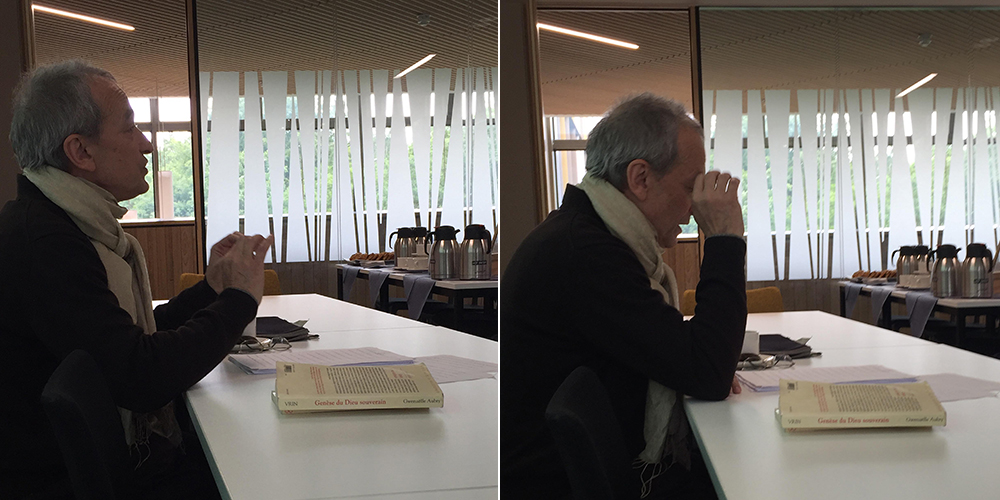
What is urgent to understand about populism, before an inquiry into its arguable or not “essential” and “true” meaning, is that in populism, unlike in academic discourse, a concept is given a paradigmatic meaning, that is, a meaning which requires that another possible meaning be forgotten. The notion of contingency, which was engaged with and harnessed by John Duns Scotus, in the 13th-14th centuries, and by Michel Foucault and Niklas Luhmann in the post second world war Europe, troubles this arrangement. Contingency, that which is neither necessary nor impossible, and yet nonetheless happens, under its Scholastic definition, is derived in reaction against the supposedly necessary nature of things.
Nowadays, populism, one could say, is a counter-reaction to this totally fluid, open and irresponsible condition of contingency. Especially when an American version of populism asserts that not everything is possible and sees the world not as a political multiplicity, but an economic unit that needs to be steered by someone probably all-powerful. Modern democratic theory brings a way out of this impasse by emphasising the (also constitutional) notion of the will. Contingency, however, is not a marginal event that can be tamed in this way, an accident, but a central concept or event, because it gives will a singular space for its manifestation in direct relation to the possible and their multiple. You can listen to the full recording of the opening talk here.
First panel
At the first panel, chaired by Dr Iain MacKenzie (University of Kent, Politics, Co-Director, Centre for Critical Thought), Professor Yannis Stavrakakis (School of Political Science, Aristotle University of Thessaloniki) inaugurated the first panel, in his talk titled Anti-populism: Genealogy of an anti-democratic myth, with the claim that an endeavour to distinguish what is populism should consider as its first priority a genealogy of anti-populism, ie populism’s other.
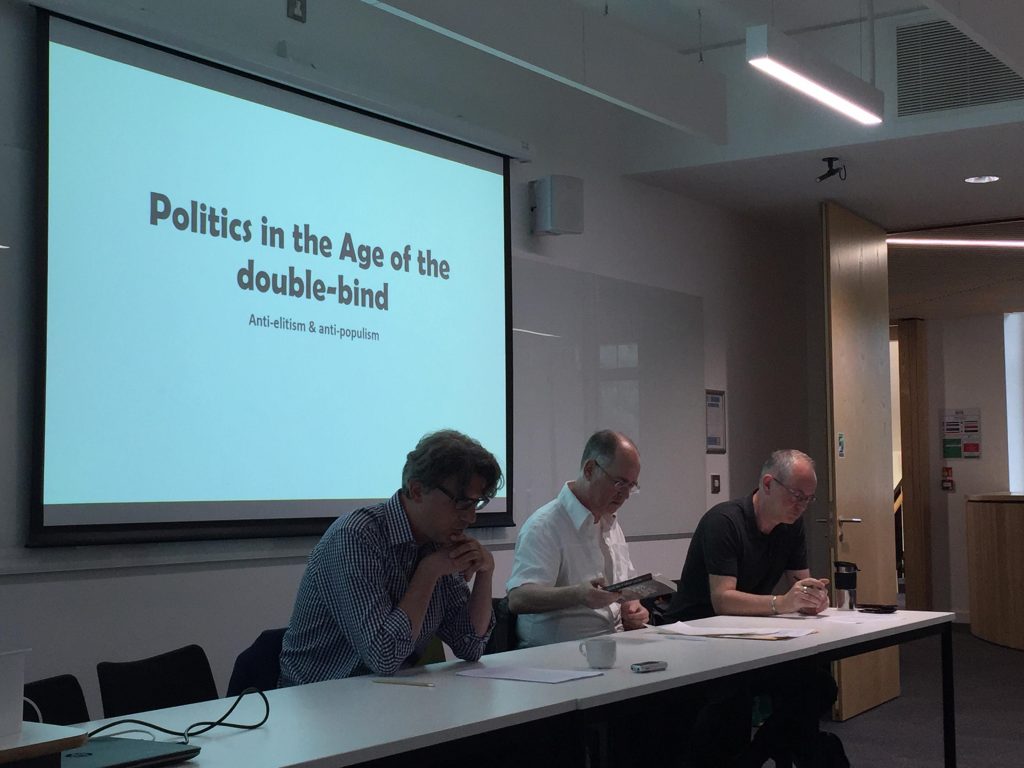
This methodological prescription follows the Saussurian insight that identity depends on difference, and is motivated by the multiplicity today of anti-populist discourses – political, journalistic, academic, which portray populism as something ‘very bad and dangerous’. This account is due to a powerful academic discourse originated in the work of Richard Hofstadter, an American pluralist, from 1955, who gave the stereotypical image of populism still very much used today, especially in Europe, as backward-looking, irrational, irresponsible, conspirational, paranoid and anti-semitic.
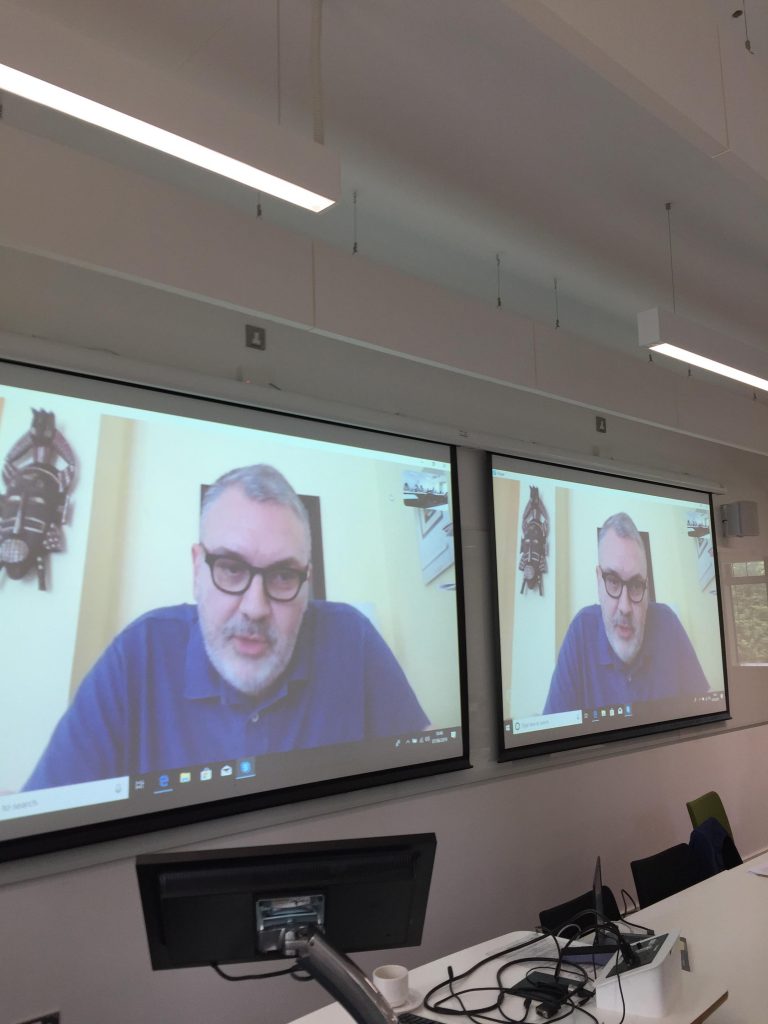
Until Hofstadter’s intervention, populism had enjoyed a positive image in the USA for over 60 years, being linked to the popular mobilisation of impoverished farmers and workers in protection of their interests against aggressive industrialisation in the USA during the 1890s, in a short-lived progressive endeavour. Informing Hofstadter’ attack on populism was his monolithic belief that there was only one way to progress and modernisation – the American blend of liberal democracy and capitalism. Hence, American populism, and all other radical movements that questioned that path became anomalous, fitting, in fact, the dynamic examined by Michel Foucault between the “normal” and the “abnormal”. This modernisation theory is indeed recognisable today in other contexts, like in countries from the semi-periphery (see Mouzelis’s work from 1986), most famously in Greece, in formulations like cultural dualism (as expressed by Diamandouros), which understands the contemporary Greek political scene as a struggle between a modernising and an under-dog cultural camp.
Professor William Watkin (University of Brunel, Philosophy & Literature) in his talk titled Trolling Democracy: Anti-Social Media and Populism highlighted, next, the rise of a new digital direct democracy in contemporary engineered by right-wing populists like the Cinque Stelle (Five Star) movement in Italy and the UK Brexit party platform in UK, which distorts meaningful participation in communal decision-making. It is based on the harnessing of a new political subject, which Watkin calls “the troll”, that is, the exaggerated, overly-emotional, over-emphatic persona version of oneself that the subject manifests in the online environment. The trolling behaviour is motivated by getting the so-called “LULZ”, celebrating the anguish of the laughed at victim, and in itself emotionally dis-associative, generative of the modern meme culture, and magnetic, in the sense of not only attracting attention, but also generating solidarity in pursuit of a common enemy– the basis of the trolls’ insults being the emotionally fragile, those of a certain gender, sexual, ethnic background.
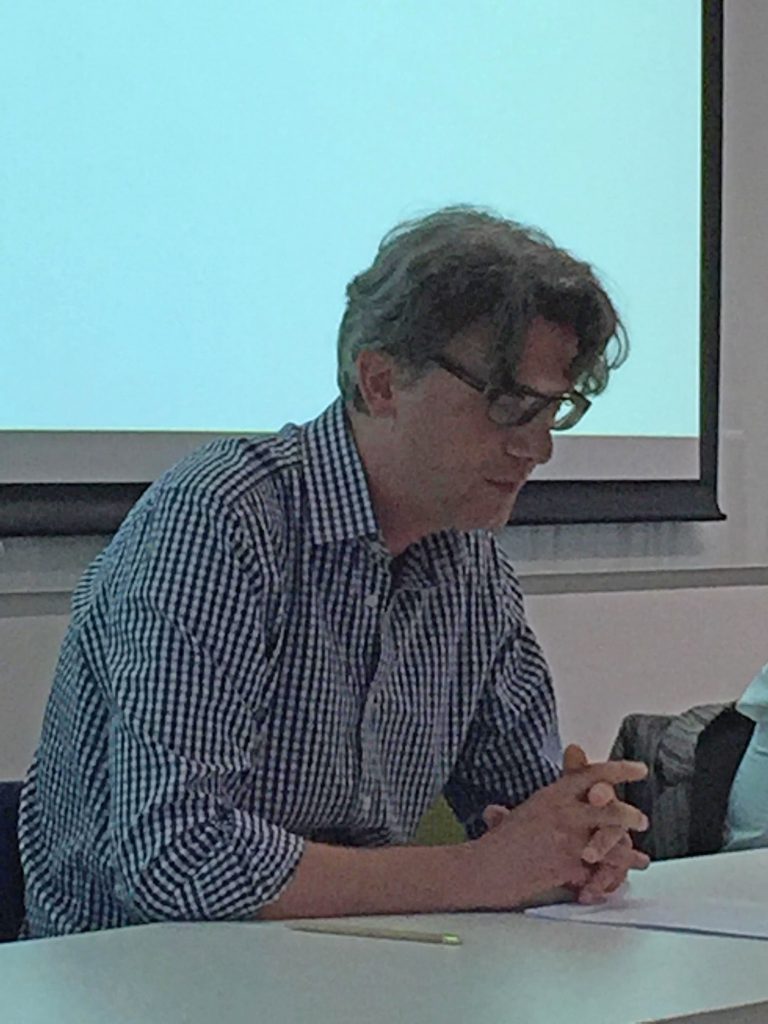
Watkin suggests then that “getting the LULZ” (emotional gratifications, for the trolls), rather than communicating arguments or truths, is the actual driver behind much right-wing populist feeling, and is a result of the communicability function of the social media. Populism makes an intervention, thus, in the mechanism of legitimating what can be said: it creates new contexts for communicability, so that what could not be said before, because it would be crucially contestable factually or rationally, can now be said, since factuality has become itself contestable. Finally, the web produces “subjectivation as desubjectivation”. In this process, the subject, while offered the illusion of a platform that allows a non-mediated expression of individuality in “micro-trolling campaigns of hate and outrage”, is incrementally turned from a user into a product, a producer of data that can be monetised and politicised by the few who exercise the un-democratic control of the online platforms (Facebook, Google, M5S, Brexit Party in UK etc).
Associate Professor Emeritus Angus McDonald (Staffordshire University) proposed in this talk titled Will of the People, Fear of the Mob: Constitutional Responses that the reactionary elitism in Plato’s Republic, which is preferred to keep the people dispersed, invisible, thus preventing it from assembling and challenging/gaining political power, is mirrored in the British constitutional tradition in its encounter, in the 19th and 20th centuries, with the democratic demand of enfranchising people. Similarly to the classical tradition, the political roles in constitutional theory appear well differentiated – the economically privileged, the middle class governing rationally, and the people ascribed to an emotional connection to the Constitution (see Bagehot). The role of Parliament is not to express the popular will and desires, but to show to the people the limits of what can be expected and to lead them into non-disruptive demands (see Dicey).
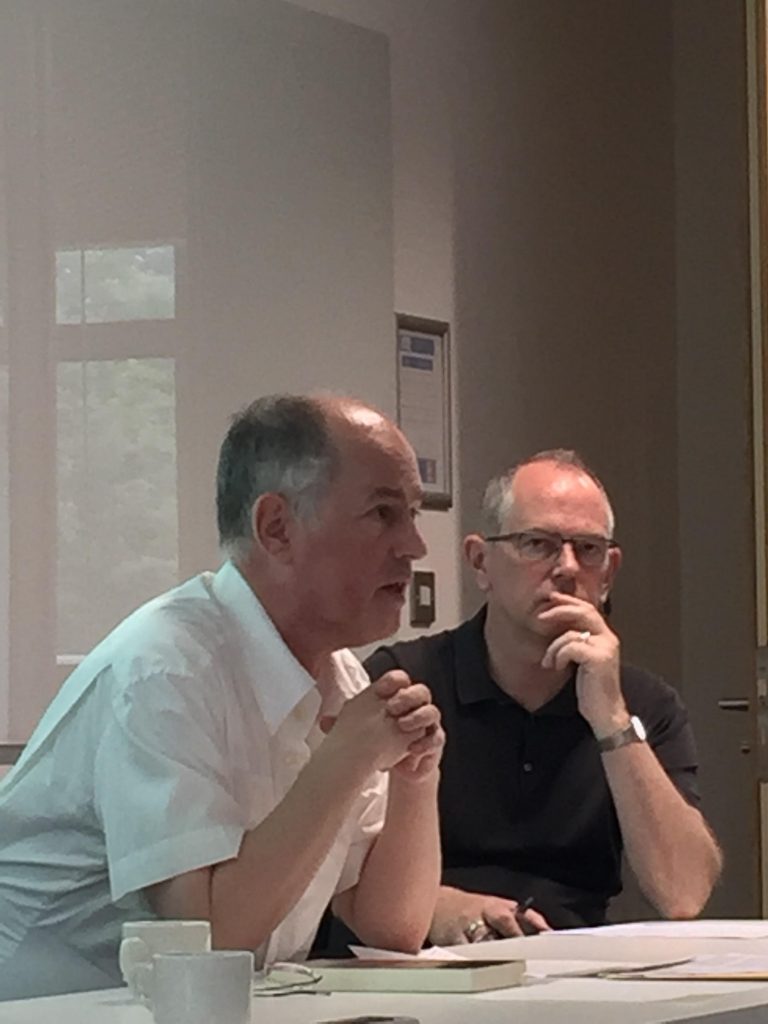
Against this mainstream account, in the critical theory of constitutionalism, Ricardo Sanín-Restrepo, for example, denounces liberal democracy for having encrypted its colonial legacy, and pleads for bringing the “hidden people” into view in a constitutional tradition in which they are either submerged or atomised. McDonald’s point, in contrast, aims at assembling the people so that they can be a block, a class with political power, and not mere voting individuals. Finally, a double-bind appears in the institutional algorithm of democracy when we impose René Girard’s schema of mimetic desire upon Plato’s schema of the democratic city’s desire for freedom: in the Brexit case, Parliament does not have any original desire to leave the EU in order to achieve freedom, but has to copy the desire it has attributed to the desiring people, and intensifies it by adding to it its own mimetic desire. However, the people were not aware of their own desire to leave, until Parliament had asked them the question in the referendum. You can listen to the whole of the first panel’s talks here.
Second panel
At the second panel, chaired by Elena Paris (Doctoral Candidate, Kent Law School) there were brought together equally distinct approaches, though while their differences resonated in a multiplicity of points, they led, ultimately, to a constructive discussion and, more importantly, to the formation of new questions:
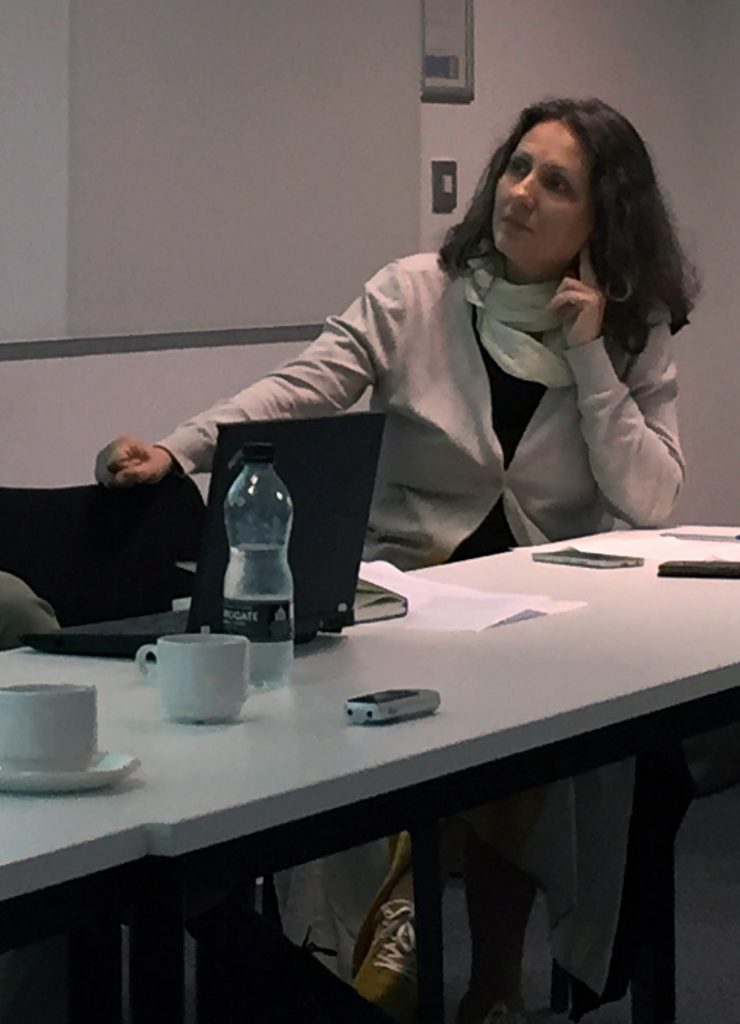
“What could or should be the response of humanities Bildung [education in an aesthetic manner of ‘self-cultivation’] to the current “political landscape of the United States and Europe (Clemens)?” “What is – or is there? – a convergence between cosmopolitanism and populism?” “Can we talk of a notion of populism coming ‘from below’” (Cărăuș)? Why is it important to refer to the notion of “the people” when we examine the phenomenon of populism?” and “Is it more accurate to talk about a notion of ‘post-fascism’, rather than a notion of populism when we refer to the European manifestation(s) of populism” (Fusco)?
In his paper entitled Narrating Political Insecurity: A Populist Turn in the Humanities, Dr Manuel Clemens (Australia National University, School of Literature, Languages and Linguistics) asked a fundamental question about the task of education of the Humanities during the current political crises. His talk examined whether a new political notion of aesthetic education [Bildung] “by means of a modern Bildungsroman [a novel narrating an account of youth’s development usually in an idealistic artistic manner] or its contemporary smaller forms like Youtube channels or comedy, can be useful in order to face these changes.” This new turn in the education of humanities, as Clemens suggested, will, potentially, form a strong political subjectivity which will be able to face the populist threat. How so? Clemens suggested that “a modern take on the genre of Bildungsroman could first recognise the individual’s conflict between tolerance and intolerance, serious analysis and populism, and even consider the position that liberal reasoning can be thoroughly false.”

This is a way that, potentially, leads to a new narrative in the education of the humanities with close attention to the illiberal and liberal manifestations of a political subjectivity, and as such in a position to, effectively, identify, prepare and give an efficient response to the usual unchallenged populist narratives, which are so successful in fact that they silence, often enough, any form of opposition. As Clemens, concluded, in order to be successful, such a ‘populist turn’ in the humanities should be, however, careful to avoid any forms and tendencies of the elitism and isolation that are, often, encountered in the academy.
The second panellist, Dr Tamara Cărăuș (University of Bucharest) in her talk titled Cosmopolitanism and Populism: from Incompatibility to Convergence, and Back, argued that despite the usual understanding of cosmopolitanism and populism as two distinct, even “opposing concepts” there are some of the points of convergence between a certain notion of cosmopolitanism and populism. To that extent, Cărăuș’ paper aimed to assess these points and their limits and so she posed the question whether it is possible to talk about a form of ‘populism coming from below’, or ‘a cosmopolitan populism.’ In order to illustrate her argument, Cărăuș identified some converging points between certain characteristics of populism movements and cosmopolitan ideas and values.
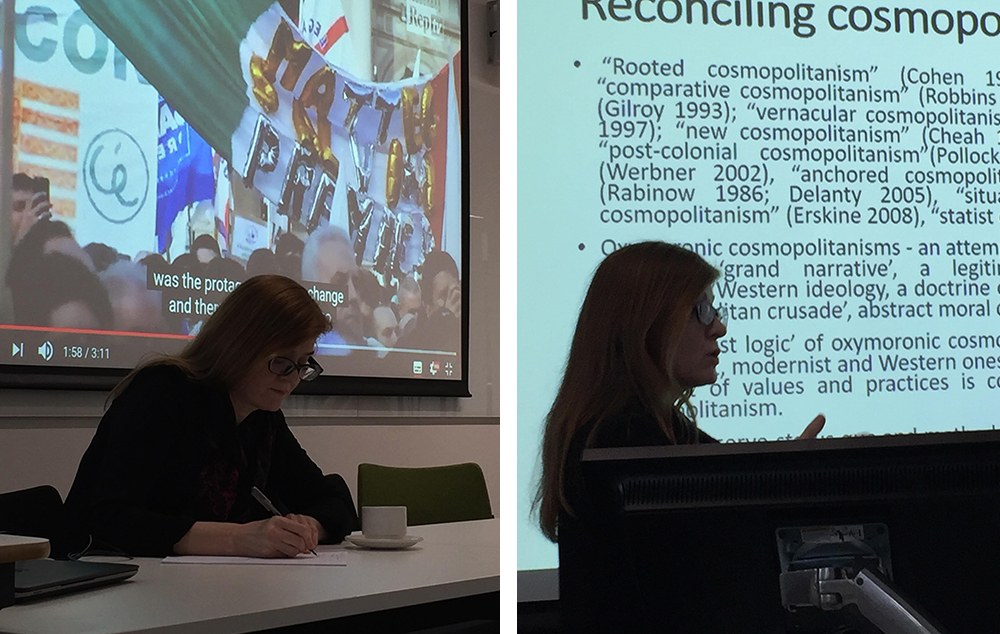
In particular, drawing from concepts such as Ernesto Laclau’s ‘chains of equivalence’ but also from the manifestos of anti-globalist movements, such as the Zapatistas (EZLN), and slogans from migrants’ protests (‘no borders,’ ‘no one is illegal’), Cărăuș illustrated how certain anti-globalist, anti-elitist demands and aspirations (characteristics that are usually associated with populist movements) can have a cosmopolitan character by ‘transcending’ the borders of the nation-state and the exclusionary features of a manifestation of populism as “a pathology.” She concluded that a cosmopolitan populism must not be seen as a project aiming to global peace and ‘consensus’ but rather as a form of “a contestatory and agonistic cosmopolitanism.”
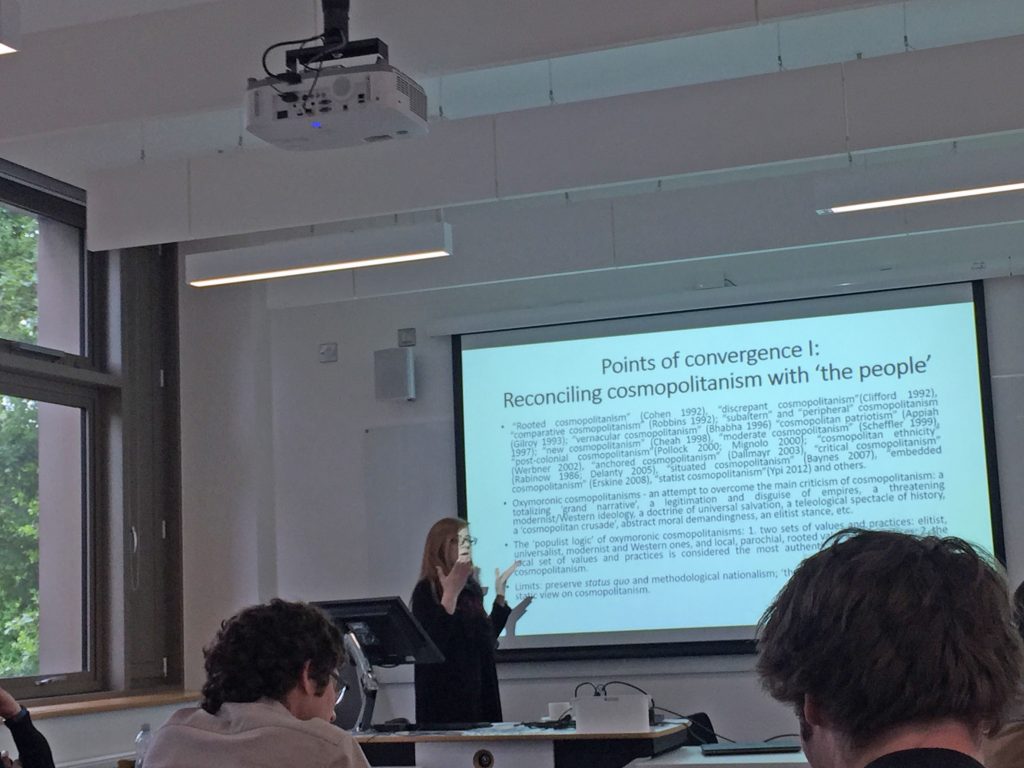
Dr Gian-Giacomo Fusco (University of Kent, School of Law) opened his talk by highlighting the importance of paying attention to the concept of ‘the people,’ which he thinks is a crucial aspect in the examination of the populist phenomena. To that extent, his paper, Wordless Ideas: Post-fascism and the Myth of the People, had as its central aim to address the aspect of ‘the people,’ In other words, Fusco asks: “What happens when someone speaks on behalf of the people?” Fusco responded that the notion of the people strengthens the populist discourse, because there is a sense that when the name of ‘the people’ is invoked, the side invoking it gains a moral superiority in the form of “a moral good whereby the people are standing up and against the elite.” This ‘moral high-ground’ of having the people by one’s side is the common narrative of populist political figures. As such, Fusco, following the historian Enzo Traverso, argued that populism, at least in its European manifestation(s), should be defined in better terms as a ‘post-fascism.’ This is because, populism shares with the old form of ‘fascism’ certain crucial characteristics (Fusco gave as examples: “the special performative way of using certain words, the presentation of people as “a mythological entity”, among else). You can listen to the whole of the talks of the second panel here.
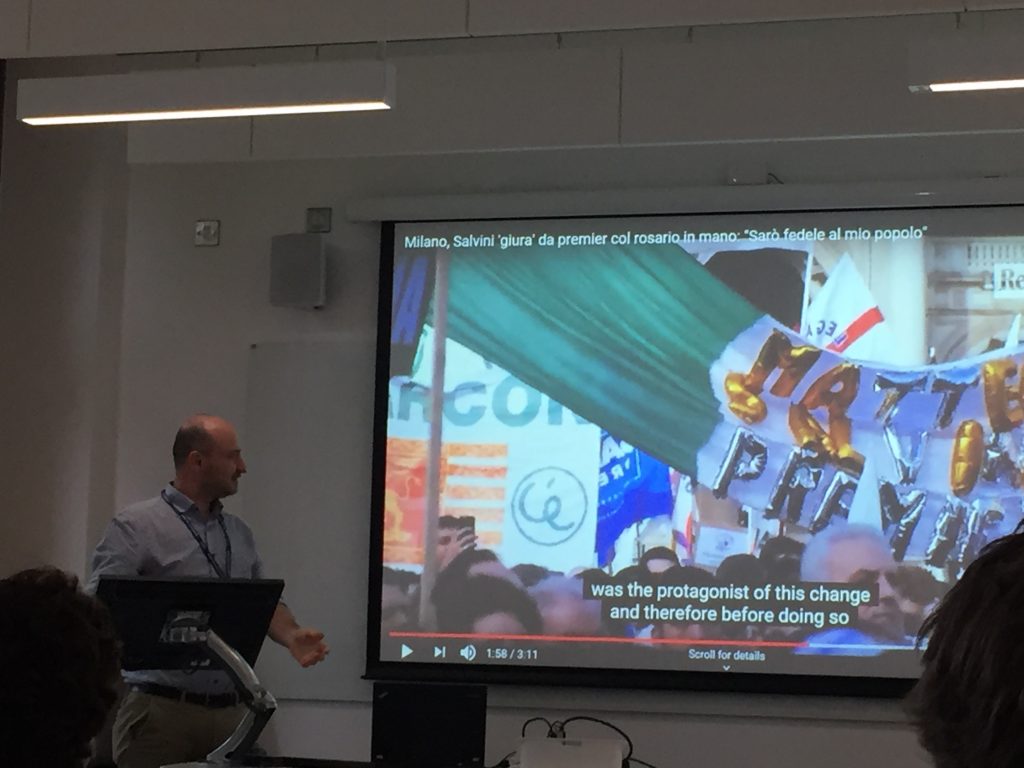
Third panel
In the third panel chaired by Dr John Ackerman (Alumni Post-Doc Kent Law School, University of Kent), Professor Agata Bielik-Robson with her paper titled Life Against the Machine: Agamben and the Philosophy of Populism opened the post-lunch discussions by explaining an understanding of populism as a conflict between an un-mediated life-world, a holistic Lebenswelt, filled with direct experiences and living presence (Habermas), and the world as mediated by expert knowledge, the Weberian machine of total rationalisation. Populism would, thus, be the vengeful return of the life-world, of those repressed by the elitist rationalist Enlightenment project. Moreover, the populism/elitism tension can be read as the confrontation between Kant’s and Rousseau’s pedagogies, one professing a cultivation of the subject towards reaching maturity, the other aiming in the reverse direction, towards a mythic lap of nature, or “infantilisation”.
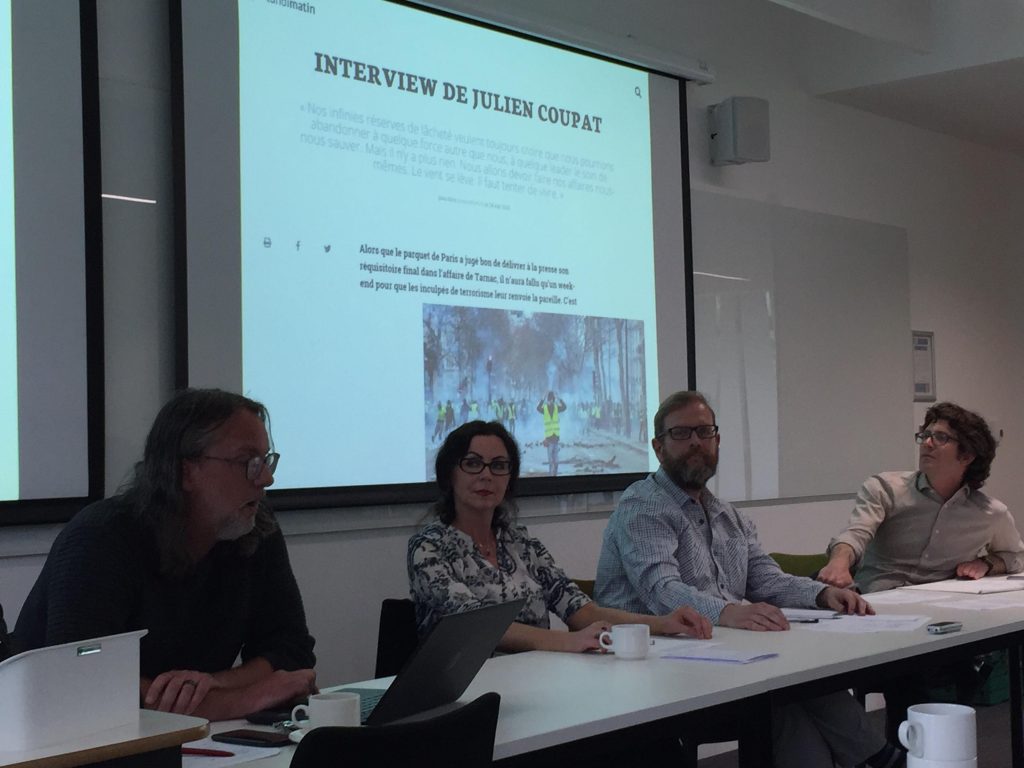
Giorgio Agamben, Bielik Robson argued, is the most outspoken contemporary “mouthpiece” of Rousseau’s “counter-pedagogy” and of uncultured life-world, bios. His project is returning self-rule to the “children”, who had been deprived of it by Kantian adults, the experts, and reactivating the anarchic powers of pure life against the calculating machine. Pure life, however, is the Christian trope of a life completely free of contaminating elements like death and law, celebrated by Schleiermacher, Blake, Heidegger and Agamben.
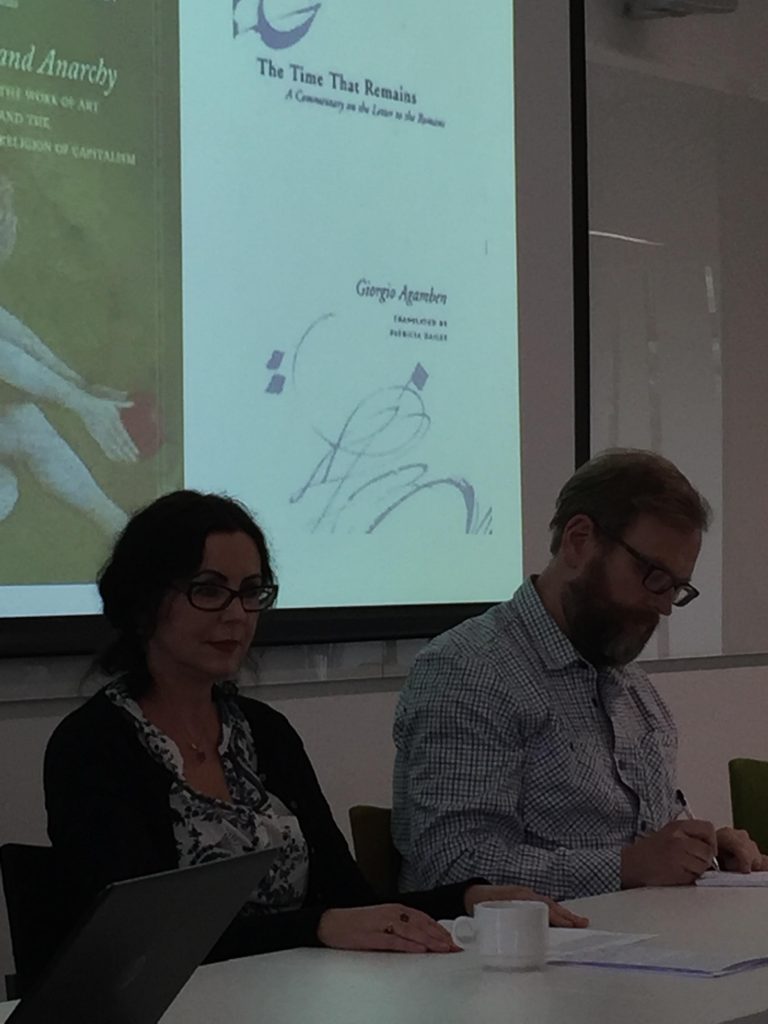
This description of life, hyper-distilled, super- and quint-essential, is contrasted with Judaism’s more complicated account of a life that is real: finite, limited, hence contaminated by death and law, never powerful enough to become fully autarchic, and never simple, expressed in Derrida’s “reality” principle of la Vie la mort, a Kantian ideal of maturation, a Herderian anthropology of lack, or a Hobbesian sovereignty as corrector of the evil state of nature. Agamben’s embrace of ‘pure life’, beyond every idea of law as external imposition, without care/ task (that is telos, ends), offers an unreserved theoretical support for the “populist rage against the machine”, but this human being freed from external impositions and constraints of self-betterment, is a voyou désoeuvré, a happy rogue of the natural world.
Dr Ward Blanton (University of Kent, School of Religious Studies) in his talk titled Populism and Its Intellectuals: Reflections on Hegel’s Coffee Machine, reminded us of the trap in assuming, as Agamben puts it, that the kingdom and the glory are the same thing; that the bureaucratic, expert universe is the same thing with the more theory-elusive and fragile-aura of glory. It takes an appropriate theatrical staging to produce a divine integration of the Kingdom and of the Glory, to make the hollow of authority shine over this or that legislation. Populism, with its practice of Deus ex machina effects, is the attempt to respond to the anxiety that the sentiment of voters does not simply submit itself to the theory of proper experts. It takes a deliberate, ascetical, effort to keep in mind that there is no coincidence between action and authority.
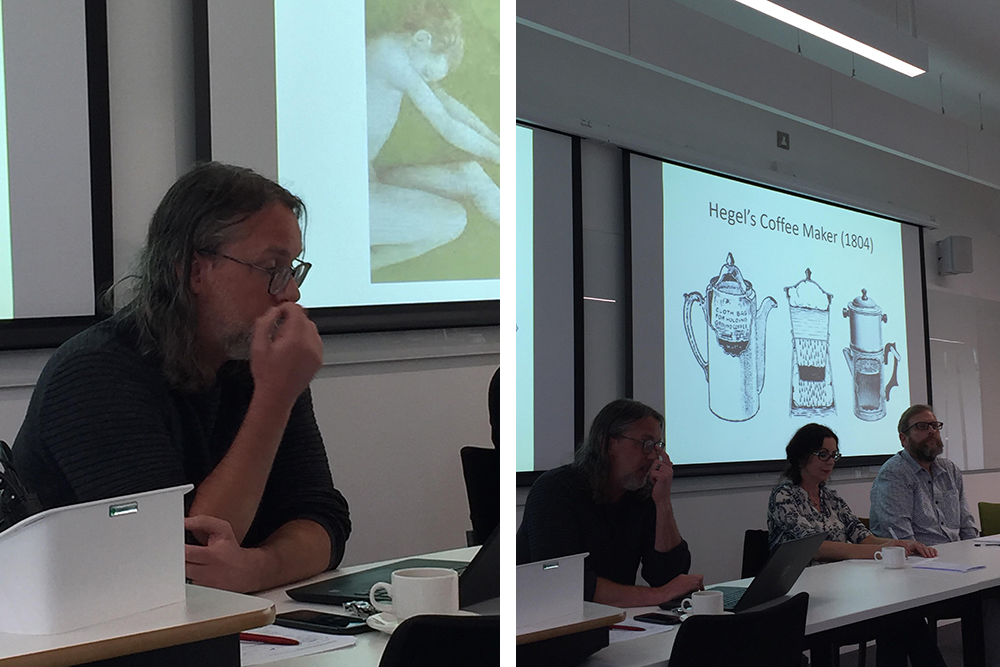
Against this background, Hegel translates Agamben’s fascination with the ‘mystery’ that surrounds the integration of the two spheres of otherwise non-coincidence between kingdom and glory, into an everyday apparatus of self-dosing, self-energising at home, namely his Benjamin Thompson Rumford coffee-maker. For Hegel, coffee functions as a means to lift the spirit up and procure a little salvation as great events like the French revolution, and Napoleon whom Hegel had imagined like its technical enactment, seem to regress, fail, remain inactual. This ecstasy of fulfilment and sublime enlightening of one’s spirit is possible only because coffee has been removed from its grounds and taken elsewhere. Similarly, the absolute freedom indicated in the French revolution was meant to migrate to another land in order to become actual. Coffee’s own history of displacements and colonialism and legislative enactments is a reproduction of world history and a model of how thinking works in relation to world historical processes to the point that a philosophy of coffee should exist.
Professor David Ayers (University of Kent, School of English) in its talk titled The Class War of the Culturati, proposed to look at a phenomenology of anti-populism, in line with Yannis Stavrakakis’ earlier talk, in terms of what are the locations, occasions, groups which identify populism as a problem. Ayers cautions that as much as we dismiss right wing populism, we all consider ourselves as democrats; and demos is a word for populus. The history of populism as a form of mobilisation includes mass people’s armies, the French revolution, the American Populist Party and the Norodniks in 19th century Russia, the Russian revolution, the rise of Nazism. Specifically, modern in populism is only the mechanics of mobilisation in the digital age, and both the right and the left use technology the same way and with the same consideration of mobilising the electorate. But this is not to say that technology is always bad, since, as Theodor Adorno says, while it can be used for Nazi propaganda and shallow entertainment, it can also have a liberating potential, by bringing the masses closer to the political decision.
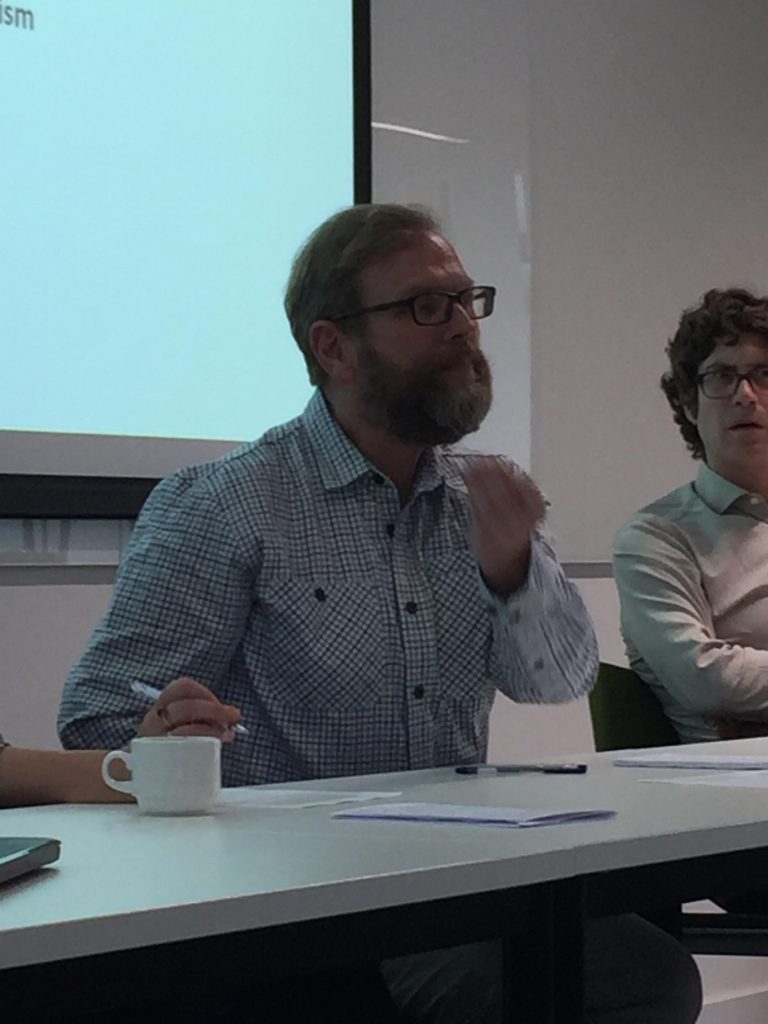
From the example of Maurizio Ferraris’ critique of the “selfie” practice as narcissistic, or Hillary Clinton’s naming of Trump supporters, opponents of the democratic rainbow coalition, as a “basket of deplorable”, Ayers estimates that the driver behind the reluctance to populism is the fear of sublimity, of the world of the enormous masses. These takes announce a class war of the cultured against the rest. We take our ethics and values to be universal, but they are produced in very particular institutional locations and centres of power, namely universities, that don’t account adequately about cultural difference and plurality. You can listen to the whole of the talks of the third panel here.
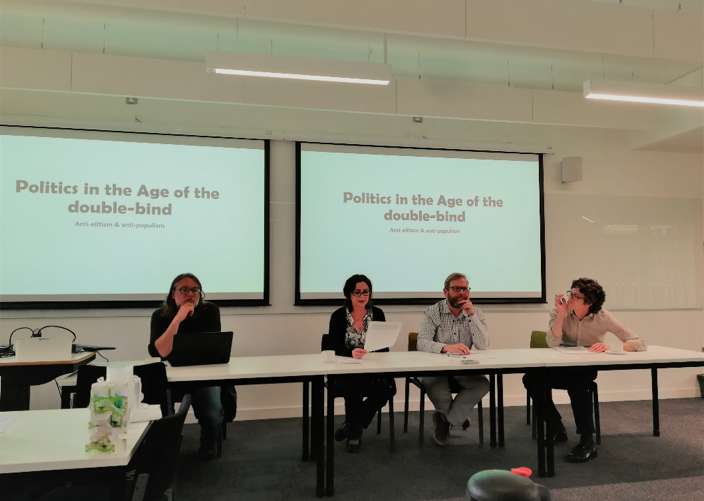
Final panel
At the final panel of the workshop, chaired by Dr Anton Schütz, Dr Thorben Päthe (University of Zurich), in his paper, titled After the End of Grand Narratives: New Populism in consideration of the Crisis of Cultural Liberalism, started by stressing that we need to take into account the fact that populism is an ‘attribution’ that is given by others and not the self. To that extent, we do not come across parties, movements, or people that are self-proclaimed as populist.
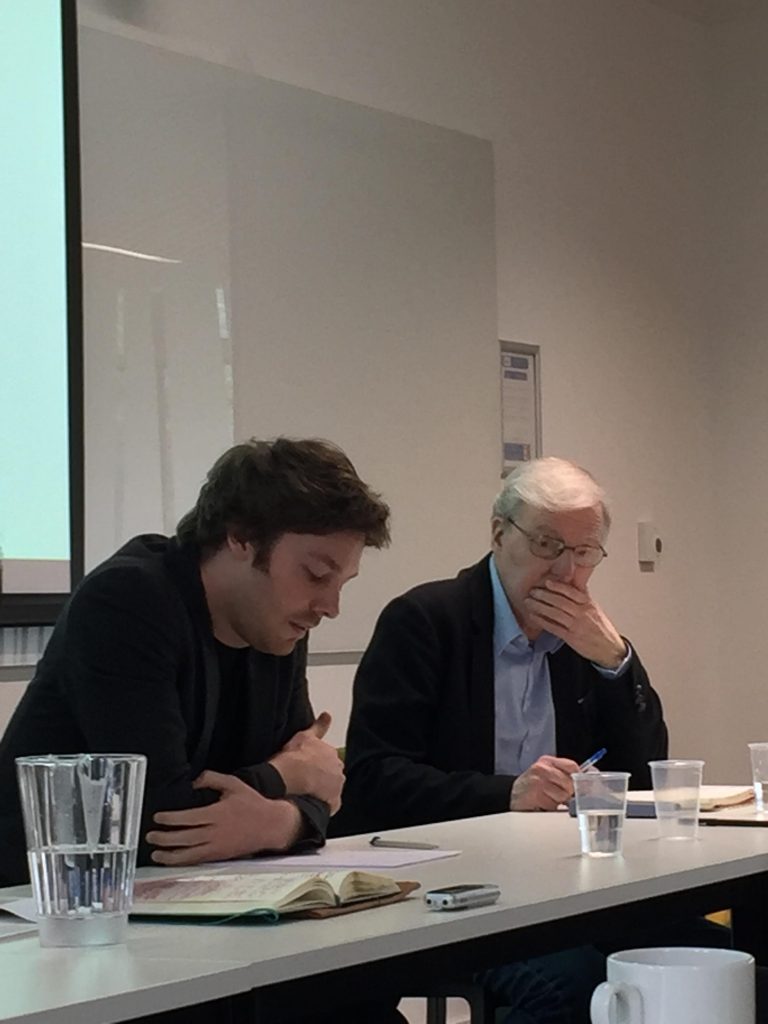
This ‘special feature’ of populist groups led Päthe to remark that populism, despite having some core characteristics (anti-elitist, anti-establishment and the claim of populists that they speak the language of ‘common sense’) is characterised by its lack of substance, in the sense of concrete, fixed values and thus, it is flexible and easily adaptable. Thus, as Päthe stated, populism is akin to “a chameleon that easily adapts to variable ideas and demands.” Indeed, this adaptability of the populist narrative, in conjunction with the crisis of Cultural Liberalism (such as identity politics and so forth), but also through populism’s call for ‘common sense’ that derives from people’s ‘concrete experiences,’ enables populism to, successfully, triumph as “a new form of authoritarianism,” as Päthe argued.
Dr Julia Ng (Goldsmiths, English and Comparative Literature, Co-Director, Centre for Philosophy and Critical Thought) started her talk by stressing the importance of taking the ‘object’ of populism seriously. In other words, who are we referring to when we speak about populism? Her largely philological, and equally poignant politically, paper (titled, From Ethnē to Ethnē: Notes on the Emergence of a Political Value) examined the etymological roots and the internal division between ‘the people’ and ‘people.’ Deriving from the Latin populus and which usually translates the Greek demos, ‘people’ “conceals an irreducible ambiguity” argued Ng. This ambiguity is manifested by the difference between ‘the people’ and the indefinite ‘people.’ The people manifest a political group, “a political reality,” with obligations and rights within a body-politique.
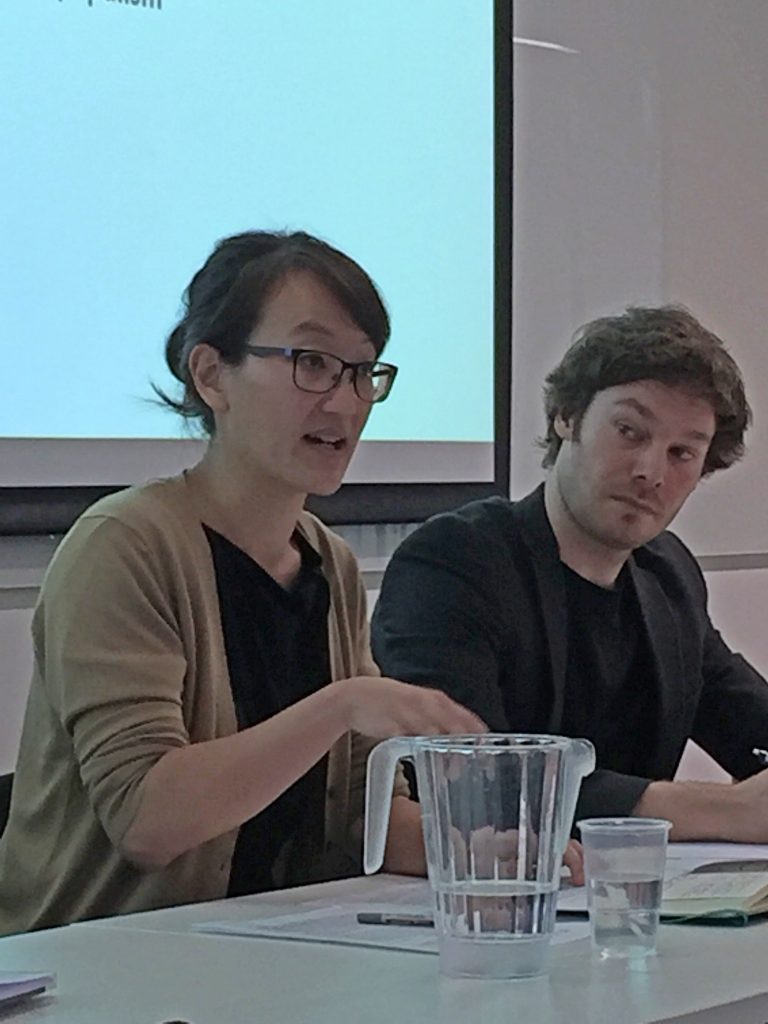
On the other hand, ‘people’ or in its plural ‘peoples’ refers to a natural or geographical reality of a people, and it can be understood as the translation of the Greek ethnos. Following Étienne Balibar, Ng argued that this division defined the function of the Western Democratic States. However, with the emergence of populism, we witness “a shift in the meaning of the people.” Ultimately, examining St. Paul’s use of the word ethnē in different contexts, Ng showed that in different contexts the meaning of ethnē distinguishes between chosen and non-chosen people, a distinction that shapes, significantly “political theology of populism.”
Professor Carsten Juhl’s (Copenhagen) paper (entitled Putting Populism on its Feet? Populus or Proletariat) started by describing the example of the strengthening of peasant movements in Scandinavia after the end of the Second World War. These movements shared features with populist movements of today, such as a claim that they were ‘coming from below’ (characteristically, these people or ‘the real people’ were called “friends of the peasants”). These people promoted a notion of life as the “real life.”
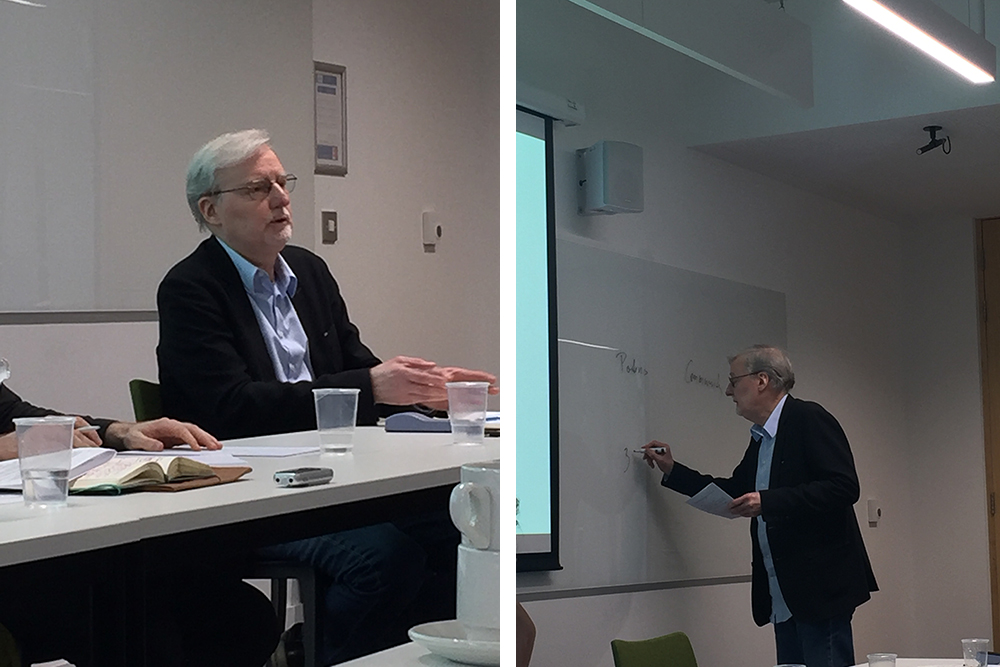
This discussion led Juhl to a brief discussion of Giorgio Agamben’s distinction between zoē and bios and his notion of ‘destitution.’ Juhl’s, following Agamben, reads destitution as an ‘openness’ and as thus, a way out of the problem of the double-bind of anti-populism and anti-elitism. As such, after a brief examination of this notion, Juhl stated that what is needed is an archaeology of the notion of destitution. Ultimately, Juhl concluded that this notion of destitution should refer to a notion of a proletariat rather than ‘the people,’ not in a form of representation of the demands of its subjects but, instead, as a form of “morphogenesis” of political subjects defined by this ‘openness.’ You can listen to the whole of the talks of the fourth panel here.
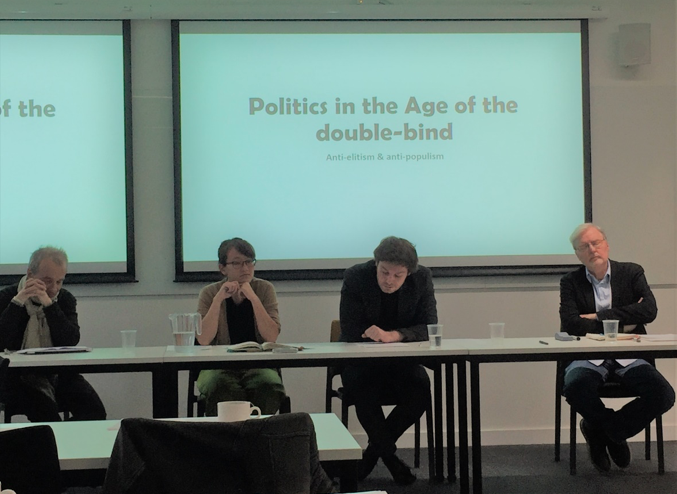
Concluding Remarks
The conference revolved loosely around the concept of populism. The divides remained un-tamed and controversies enriched the conversation, leading only to at times however fragile and provisional areas of shared understanding. In the end, in the concluding observation by Dr Zartaloudis, scepticism emerged as a possible third position between populism and elitism, and as a way out of their entanglement in a double-bind. The sceptic, it was suggested, does not even enter the realm of high-speed inter-communicability and scepticism might embody an ethical third position of practice since it raises, by definition, as its primary question: what kind of difference does one’s intervention make to the world?
The organisers have already announced the intention of editing a collection with the contributions, as well as their plans to renew the meeting at Kent next year. Interested parties can directly contact Dr Zartaloudis at: t.zartaloudis@kent.ac.uk
[i] Elena Paris is a doctoral candidate at Kent Law School and a diplomat. Her thesis is titled International law and the post-foundational challenge: theologies of legal universalism.
[ii] Christos Marneros is a doctoral candidate at Kent Law School. His thesis is titled: Human Rights After Deleuze: Towards a Jurisprudence of a Becoming-Human

